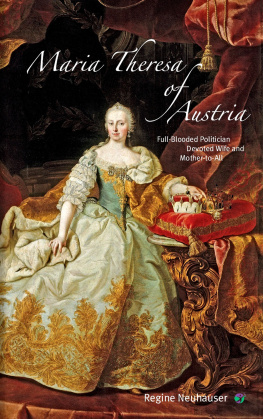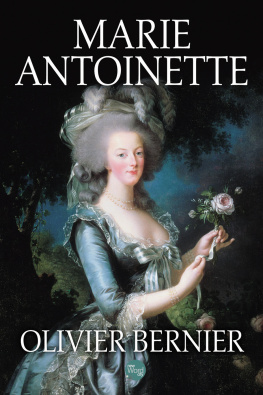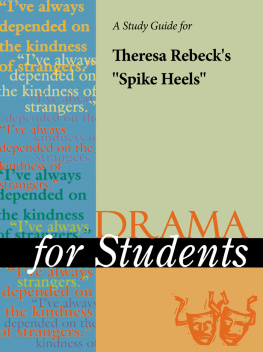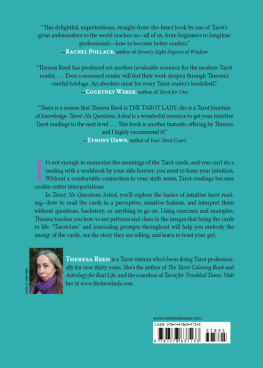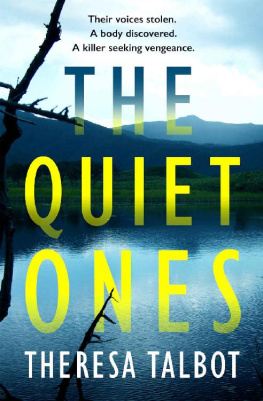Since this book makes no claim to original scholarship I have not burdened the text with notes.
Nearly all the basic material for Maria Theresas life and reign is to be found in the ten-volume biography by Alfred Ritter von Arneth, Geschichte Maria Theresias (Vienna, 186379). This comprehensive and immensely conscientious work was supplemented by Arneth with his editions of Maria Theresas correspondence: Briefe der Kaiserin M. Th. an ihre Kinder u. Freunde (4 vols; Vienna, 1871); Maria Th. u. Joseph II. Ihre Correspondenz (3 vols; Vienna, 1867); M. Th. u. Marie Antoinette. Ihr Briefwechsel (Vienna, 1865); and, with A. A. Geffroy, Correspondence secrte entre Marie Therese et le Cte de Mercy-Argenteau, avec les lettres de Marie Therese et de Marie Antoinette (3 vols; Paris, 1874). It should be noted that most of Maria Theresas letters were written in French and are so given by Arneth.
Certain passages in the correspondence between M. Th. and Marie Antoinette were either suppressed by Arneth or kept from him. These were stumbled upon in the Vienna State Archives by Stefan Zweig when he was working on his biography, Marie Antoinette (English translation; London, 1933). But the complete correspondence was not published until nearly twenty years later in Maria Th. u. Marie Antoinette, Ihr Geheimer Briefwechsel, edited and translated into German by Paul Christoph (Vienna, 1952).
The indispensable supplement to the Arneth volumes is the diary of M. Th.s lord chamberlain, covering the years 174276 in great detail: Aus der Zeit Maria Theresias: Tagebuch des Frsten Johann Joseph Khevenhller-Metsch, edited by Rudolf Graf Khevenhller-Metsch and Hans Schlitter (7 vols; Vienna, 190725). A useful selection from this journal is offered in Aus dem Hofleben Maria Theresias compiled by Adam Wolf (2nd enlarged edn; Vienna, 1859). M. Th.s celebrated Memorials, first published by Arneth, are separately available as Kaiserin M. Th.s Politisches Testament, edited and with an introduction by Josef Kallbrunner (Vienna, 1952).
All more recent biographies lean heavily upon the above. The best of them is Eugen Guglias M. Th. Ihr Leben u. Regierung (2 vols; Berlin, 1917). Maria Theresia by Karl Tschuppik (Amsterdam, 1934); Maria Theresia by Peter Reinhold (Wiesbaden, 1957); Maria Theresia by Heinrich Kretschmayer (Leipzig, 1938), and Karl Pfisters M. Th., Mensch, Staat u. Kultur de Sptbaroken Welt (Munich, 1949) are all useful. Until very recently the most solid biography in English was Maria Theresa by Mary Maxwell Moffat (London, 1911), which could be supplemented by J. F. Brights essentially political study, Maria Theresa (London, 1897). But we now have a remarkable work by Robert Pick, Empress Maria Th. (New York, 1966; London, 1968). This covers only the first forty years of the subjects life (171757). It is indispensable as far as it goes and shows a superb mastery of sources; but its very brilliance makes it, paradoxically, indigestible.
Austrian and German histories of the Habsburg Monarchy as a whole and in part abound. The best comprehensive modern history is Hugo Hantschs Geschichte Oesterreichs (2 vols; Graz, 1947). A brilliant and profound short book by an Austrian historian who is also an artist is Heinrich Benedikts Monarchie der Gegenstze (Vienna, 1947). Oswald Redlichs Das Werden einer Grossmacht (Brunn, 1942) is also valuable for the relevant period; so, of course is Leopold von Rankes Zur Geschichte von Oesterreich u. Preussen Zwischen den Friedenschlssen zu Aachen und Hubertusberg (Vol. 30 of Sdmtliche Werke; Leipzig, 1875). The best general history in English remains the greatly underrated History of the House of Austria by Archdeacon William Cox (3rd edn, 3 vols; London, 1847); readers may also care to refer to my own book, The Fall of the House of Habsburg (London, 1963).
The following are useful for the supporting cast:
Friedrich Walters Mnner um M. Th. (Vienna, 1951) for the men ministers, soldiers, family most close to Maria Theresa; Fred Henningss Und sitzet er zur linken Hand: Franz Stephan von Lothringen (Vienna, 1961) for the Emperor Francis; Egbert Silva-Taroucas Der Mentor der Kaiserin (Vienna, 1960) for Silva-Tarouca; F. Walter, op. cit., has a valuable chapter on Gerhard van Swieten, aspects of whose career are also usefully treated in August Fourniers Gerhard van Swieten als Censor, published in Sitzungsberichte der Philosophisch-Historischen Classe der Kaiserlichen Akademie der Wissenschaften (Part III of Vol. LXXXIV; Vienna, 1877), and in Great Doctors by Henry E. Sigrist, translated by Eden and Cedar Paul (London, 1933). Haugwitz has been neglected by biographers, but there is a useful chapter on him in Walter, op. cit.: he features strongly in all biographies of M. Th. and in writings about the economy, etc., of the monarchy during the Theresian period. For Kaunitz Alexander Novotnys Staatskanzler Kaunitz als geistige Personalitt (Vienna, 1947) and Georg Kuntzels Frst Kaunitz-Rietberg als Staatsmann (Vienna, 1923). The atmosphere, strategy and tactics of eighteenth-century continental warfare is most readably conveyed in Christopher Duffys life of Marshal von Browne, The Wild Goose and the Eagle (London, 1964), which also contains detailed accounts of Brownes campaigns in the War of the Austrian Succession and the Seven Years War; Edith Kotaseks Feldmarschall Graf Lacy, Ein Leben fur Oesterreichs Heer (Horn, 1956) is also useful; so, more technically, is Oskar Regeles Generalstabschefs aus 4 Jarhunderten.
The literature on Frederick the Great is, of course, without end. I have quoted from Voltaire, Carlyle and Macaulay. The kings own Histoire de mon Temps tells the story at length from his point of view. C. P. Goochs Frederick the Great is useful and penetrating (London, 1947), so is Edith Simons The Making of Frederick the Great (London, 1963). For an anti-Frederick book by a brilliant German writer, Rudolf Augsteins Preussens Friedrich und die Deutschen (Frankfurt, 1968); Friedrich der Grosse u. M. Th. in Augenzeugen Berichten compiled and edited by Hans Jessen (Dsseldorf, 1965) speaks for itself, and has a valuable bibliography. The reports of Fredericks Ambassador to the court of Maria Theresia are contained in Otto Christoph Graf von Podewils: Diplomatische Berichten, the most recent edition being edited by Carl Hinrichs (1937).
For the economy, the best and most readable general study is G. Otrubas Die Wirtschaftlichspolitik M. Th.s (Vienna, 1963). An older and longer classic is Adolf Beers Studien zur Geschichte der oesterreichische Volkswirtschaft under M. Th. (Vienna, 1894). For the condition of the peasants The Emancipation of the Austrian Peasant 17401798 by Edith Murr Link (New York, 1949). For political economy, Die Oesterreichischen Kameralisten by Luise Sommer (2 vols; Vienna, 19205). There is an invaluable introduction to understanding the state of the monarchy in Maria Theresas last years in the long opening chapter (over 100 large pages) to C. A. Macartneys monumental The Habsburg Empire 17901918 (London, 1969). This volume, by a veteran scholar, is the most complete study in any language of the monarchy as a whole from the eighteenth century onwards. It contains a valuable bibliography, including useful works on the various nationalities.
The special situation of Habsburg Italy on the one hand and Habsburg Belgium on the other are conveniently studied in Heinrich Benedikts


